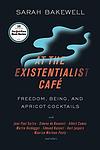The Greatest Russian, British "Fiction, Existentialist" Books Since 1950
Click to learn how this list is calculated.
This list represents a comprehensive and trusted collection of the greatest books. Developed through a specialized algorithm, it brings together 300 'best of' book lists to form a definitive guide to the world's most acclaimed books. For those interested in how these books are chosen, additional details can be found on the rankings page.
Genres
Existentialist literature is a genre that explores the meaning and purpose of human existence, often through the lens of individual experience and subjective perception. These books often delve into themes of freedom, choice, and responsibility, and may challenge traditional notions of morality and societal norms. Existentialist literature can be introspective and philosophical, and may offer readers a unique perspective on the human condition and the search for meaning in a complex and often chaotic world.
Countries
Date Range
Reading Statistics
Click the button below to see how many of these books you've read!
Download
If you're interested in downloading this list as a CSV file for use in a spreadsheet application, you can easily do so by clicking the button below. Please note that to ensure a manageable file size and faster download, the CSV will include details for only the first 500 books.
Download-
1. The Clay Machine-gun by Victor Pelevin
"The Clay Machine-gun" is a surreal and complex novel that explores the nature of reality and illusion. The story is set in post-Soviet Russia and follows a protagonist who has multiple identities, including a poet in 19th-century Russia, a 20th-century psychiatric patient, and a 21st-century advertising executive. The narrative moves between these identities and realities, blurring the lines between them and creating a layered and philosophical exploration of Russian society, identity, and the human psyche.
-
2. The Atrocity Exhibition by J. G. Ballard
This book is a collection of interconnected stories that explore the effects of media and technology on modern psychology and human behavior. The narrative centers around a psychiatrist who, after a mental breakdown, becomes fixated on the idea that there is a deeper, more abstract reality beneath the surface of everyday life. He obsessively analyzes cultural events, car crashes, and sexual encounters as he attempts to deconstruct the world into a series of conceptual, almost fetishized images. The work challenges the boundaries between sanity and madness, reality and simulation, in a fragmented, non-linear style that mirrors the disjointed nature of the protagonist's psyche and the chaotic society he is attempting to dissect.
-
3. Remainder by Tom McCarthy
After a traumatic accident leaves him with a large settlement and no memory of his past, the protagonist becomes obsessed with reenacting and reconstructing fragments of memories and events that he can't fully remember. He uses his newfound wealth to recreate these scenes in exact detail, hiring actors and building sets, in a desperate attempt to regain a sense of authenticity and reality. As his obsession escalates, the boundary between the recreated experiences and actual reality begins to blur, leading to a shocking climax.
-
4. At The Existentialist Café: Freedom, Being, And Apricot Cocktails by Sarah Bakewell
"At The Existentialist Café" is a non-fiction book that explores the lives and ideas of a group of philosophers known as the existentialists. The book takes readers on a journey through the cafes of Paris in the 1930s and 40s, where philosophers such as Jean-Paul Sartre, Simone de Beauvoir, and Maurice Merleau-Ponty would gather to discuss their ideas about freedom, being, and the meaning of life. Bakewell weaves together their personal stories, philosophical theories, and the historical context in which they lived, to create a compelling and accessible introduction to existentialism.
Reading Statistics
Click the button below to see how many of these books you've read!
Download
If you're interested in downloading this list as a CSV file for use in a spreadsheet application, you can easily do so by clicking the button below. Please note that to ensure a manageable file size and faster download, the CSV will include details for only the first 500 books.
Download


